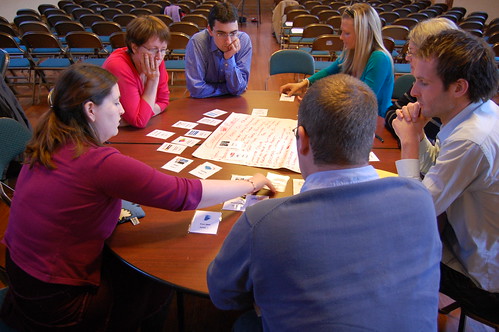
I have run the social media game many times now, and it always turns out differently and is always rewarding, and interesting.
Basically, it is learning and FUN!
Here is a PDF of the cards I used, which I put together about a year ago for the 2gether08 conference. It’s based on the original by David Wilcox and friends, which has subsequently been developed in a different direction into the Social by Social game.
I’ve been involved in building and managing online communities for a while now, and it looks like I’m going to be doing even more in the near future (more on that later). To help refine my own thinking, and as an aid in planning online community work, I’m putting together a version of the game specific to to community building.
The game will work as normal, with teams asked to produce ideas around projects or problems which an online community could help solve. Then, in this version, the teams use three sets of cards to develop a strategy for what that community needs to work effectively. The sets of cards are technology, roles and activity.
Here are the cards I have thought of, under each category. Have I missed anything obvious? Anything you would change?
1. Technology
Hopefully these are self explanatory:
- Blogs
- Forums
- Profiles
- Status updates
- Wikis
- RSS feeds in
- RSS feeds out
- Embedable media
- Polls and surveys
- Email alerts
- Respond by email
- Email newsletters
- Groups
- Event listings
- Document sharing
- Social bookmarking
- Chat
- Third Party Applications
- Public and private spaces
2. Roles
Note – these are my definitions for the purpose of this game. You might not necessarily agree with how I describe certain roles – let me know in the comments if you would call them something different!
- Community manager – overall responsibility for success of the community
- Community cultivator – helps to develop conversations and use of the community
- Digital curator – finds good content on the community and elsewhere, and brings it to members’ attention
- Social reporter – creates content around the subject of the community, whether text, images, video or audio
- Community evangelist – someone to promote the community and encourage new members to sign up
- Moderator – ensuring content is appropriate for the community, works with members to ensure conversation stays on track
- Technology steward – helps manage the tech side of the community, provides help and support on how to use the features available, plans for future development
- Domain expert – someone with a deep knowledge of the subject matter of the community
- Facilitator – someone with a wide range of skills who can support the community by providing a little of all the other roles
3. Activities
These are a touch verbose right now, and will need to be a bit more succinct to fit on the cards!
- Plan community activity in advance
- Identify existing communities (online and offline)
- Identify enthusiastic potential members
- Identify relevant websites to promote community
- Promote community through social networking sites
- Run hotseats
- Seed content and discussions
- Run online conferences
- Develop user guidelines and policies
- Communicate with members and potential members using backchannels
It would be awesome to get feedback on these ideas before I set @davebriggswife to work with the laminator!

